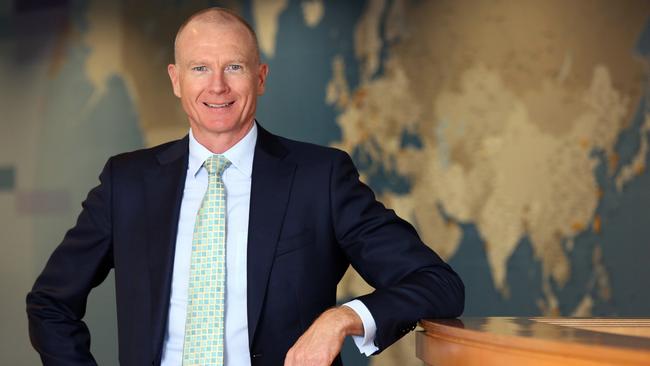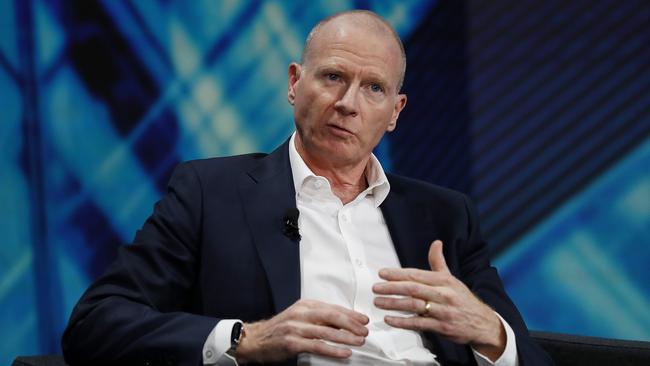Cochlear boss Dig Howitt says Australia’s tax regime hinders R&D, but there’s a simple fix
Cochlear chief executive Dig Howitt says Australia needs to increase the research and development tax incentive threshold and dust off a Morrison government-era plan.

Australia is not a competitive place to commercialise innovative new products, and it needs to boost tax incentives for research and development, Cochlear chief executive Dig Howitt says.
Furthermore it should dust off a proposal for tax concessions for new technology products which should have been put in place two years ago, he believes.
Mr Howitt said there were “pretty good indicators” that Australian productivity growth had been moribund for much of the past decade, and that economic growth on a per-capita basis had gone backwards for the past six quarters.
Add in inflationary pressures over the past few years and “they’re pretty good indicators that the standard of living isn’t increasing as it has done for the last 30 years’’.
“The economy isn’t growing on a per-head basis at the rate that would improve living standards, and productivity is one of the key drivers or enablers of that,’’ Mr Howitt told The Australian.
He said a key driver of productivity was innovation and new product development, but Australia was getting in its own way with an uncompetitive approach to supporting product commercialisation.
More broadly, Australia’s corporate tax rate was too high. But given the difficulties with reform on that scale, targeted incentives to boost commercialisation should be improved, he said.
Mr Howitt said the current research and development tax incentive was “actually a pretty good system’’, but capping the program’s upside at an expenditure threshold of $150m limited its utility.
The system is tiered depending on turnover. For entities with turnover of less than $20m it provides a refundable tax offset equal to the company’s tax rate plus 18.5 per cent for eligible expenditure.
For companies with a higher turnover there is a tiered system involving a non-refundable tax offset at the company’s tax rate plus either 8.5 per cent or 16.5 per cent.
Once the $150m spending cap is breached, the offset reduces to the company’s tax rate for that portion of expenditure.
Mr Howitt said that over time he would like to see an uncapped system put in place, however increasing the threshold to $250m, while reviewing the operation of the program, would be a good start.
“Effectively we’re saying that we want people to do R&D in Australia, but please don’t do too much,’’ Mr Howitt said.
“So we get lots of smaller companies doing R&D, but there’s no reason for a big company to do a lot of R&D in Australia.’’
Mr Howitt said Australia also tended to do more research and development than product commercialisation, partly because the high corporate tax rate made it a less attractive place to base a company.
“I think trying to reduce that across the board is just politically and economically very difficult, but targeted reductions are what other, countries are doing,’’ Mr Howitt said.
He said the Patent Box proposal which Scott Morrison’s government announced in the 2021 Budget – but which was never implemented – should be dusted off.
A Patent Box is a targeted program which provides concessional tax treatment to profits derived from eligible intellectual property (IP).

“Currently, over 20 jurisdictions, including the UK, Singapore and many European countries have patent boxes or other regimes that offer concessional tax treatments to IP-derived profits,’’ the federal government said in 2021, while consulting stakeholders on the design of its proposed program.
“The aim of the government’s policy is to encourage companies to base their medical and biotechnology research and development operations, and commercialise innovation, in Australia and to retain associated patent profits in Australia.’’
Cochlear argued at the time that the Patent Box should offer a tax rate of 10 per cent, in line with other jurisdictions, and also that patents filed before the announcement of the policy should be allowed, given the long development time frames for medical device development.
Cochlear warned at the time that global companies such as itself had flexibility about where to conduct research, making it imperative that Australia’s taxation framework was fit for purpose.
“As Cochlear’s business and global footprint continues to grow we have greater flexibility in where we conduct R&D whether alongside current R&D capacity in Belgium, Sweden or the United States or co-located with new manufacturing facilities in Malaysia and China,’’ the company said.
“These countries, and many others, actively and aggressively compete for our R&D and manufacturing investment by offering a suite of investment incentives including, in more than 20 other countries, patent boxes.
“Cochlear’s preference is to invest in Australia to the greatest extent possible where it makes sense for the future of our business and provides value to our customers, employees, and shareholders.
“The design of the new Australian patent box will be an important factor in making these decisions.’’
Blood products company CSL also said at the time that the proposed 17 per cent tax rate announced in the Budget was uncompetitive, and the global norm was 10 per cent.
The aim was for the Patent Box to be introduced and open to eligible companies from July 1, 2022, however it was never legislated, and Mr Howitt said it did not appear to be a priority for the Albanese government.
Mr Howitt said there also need to be more scrutiny on the cost/benefit ratio of regulation, with the level of reporting that companies in Australia are required to do – albeit driven with “good intent” – a hindrance to new product commercialisation.



